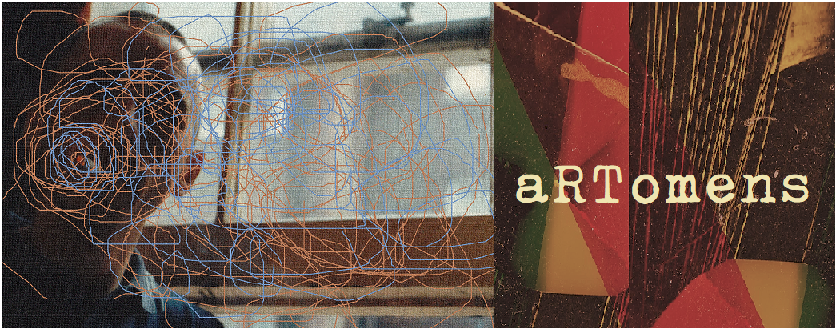 |
| Choice and Defiance, RTomens, 2017 |
When you look at abstract art are you thinking from the bottom up or top down? This article relating to such things prompted a discussion with LJ this morning about why Mr & Mrs People don't 'get' abstract art. Bottom up thinking is wanting to make sense of things we see due to centuries of bio-programming, whereas top down thinking relies on 'personal experience and knowledge', apparently.
So I had a fink about all this...
...and it bloody well hurt, I can tell you...
...but it struck me as ironic that Mark Rothko and Jackson Pollock are used in the article as examples of abstract art that would dumbfound the dumb because, as you know, they're postcard stars of the art world. By which I mean they've broken out of the abstract ghetto and, to a large extent, into the mainstream. Which is not to say that most 'uneducated' (art appreciation-wise) folk wouldn't look blankly at work by either; just that a show of Rothko's would undoubtedly be massively popular, not least because somewhere down the line of transmission in pop culture he got a rep, probably the biggest rep, for being 'spiritual'. So it became received wisdom that to sit surrounded by Rothkos for half an hour would amount to a divine experience. People want that. If they don't go to church to get it being transformed into a Zen-like state of meditative bliss by works of art is a 'cool' alternative.
People will buy any old shit if it's packaged and promoted well. Returning to matters psychological, as with UFOs, if people want to believe, their minds will interpret any phenomenon relating to their desires as fact.
We are totally programmable, no doubt about that. Often it seems we can be programmed more thoroughly if our personalities render us more susceptible. Don't they say that only certain people can be hypnotised and that hypnotists have trained themselves to spot them? Why do some people discover 'abstraction', or any non-linear art forms and respond positively, whilst others reject them? Is it simply a matter of education? Or what we call 'open-mindedness'? And why does that open mind evolve?
Yes, more questions than answers. I do apologise. It's obvious to me, though, that social programming plays a huge part in how we respond to art. We go through extensive programming (or training) from an early age, from nursery rhymes to Pop music (by which I mean everything from club music to simple songs), pictures in books to cinematic stories. All the time getting used to the idea that everything must have a beginning, middle and conclusive end, tell a 'story' or mirror reality, visually. No wonder we're stumped by anything that doesn't offer neat resolutions.
If, as they say, children can be more responsive to radical art than us baggage-laden adults, it surely suggests that such free thinking is beaten out of us by the full force of mainstream culture's capitalist, market-driven instruments. We succumb readily to their powers of persuasion and therefore feed a massive sector of the economy.
I'm not suggesting society (or a large section of it) would collapse should we free ourselves from these shackles, but a lot of careers (and jobs) would go down the pan. Perhaps, after all, there is a wider conspiracy to keep us thinking narrowly when it comes to the arts. It may be unspoken and not officially organised, but it's there by mutual consent.
Ironically, Abstract Expressionism (along with Jazz) was used as a weapon by the CIA during the Cold War. It represented the kind of 'freedom' Commies simply couldn't have. Freedom though, as represented by abstract art (music, film or literature), seems to be what the majority of people in the West don't want or understand.

No comments:
Post a Comment